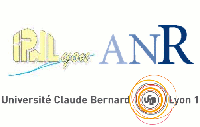Orateur
Dr
Vitalii Mikhailik
(Univ of Oxford)
Description
The simultaneous detection of a phonon and a scintillation signal, as a result of energy deposition in the target material, by particles or high-energy quanta, is a promising technique. This detection method allows efficient discrimination against electron recoils caused by radioactive background. It is believed that phonon-scintillation detectors can achieve the sensitivity levels required by future experiments searching for rare events, such as interactions of Weakly Interactive Massive Particles (WIMP) and double beta decay. Therefore, identification, characterisation and optimisation of potential scintillation materials for low-temperature application is an important task driven by the demands of cryogenic experiments searching for such rare events.
In this talk we will discuss recent progress achieved in the research and development of scintillation materials for these applications, both in the material development and the understanding of scintillation mechanisms, as well as the underlying physics. The results of the studies of optical (transmission, luminescence) and scintillation characteristics (light yield and decay time) of the materials so far selected for rare event searches will be presented. Given that the ultimate sensitivity of the detector is defined by the intrinsic radioactivity of the material, this issue will also be addressed through research effort aimed at scintillator development. Finally, the performance characteristics and the potential of different scintillators will be discussed from the standpoint of the requirements imposed on the materials.
Auteur
Dr
Vitalii Mikhailik
(Univ of Oxford)
Co-auteurs
Dr
Fedor Danevich
(Kyiv Institute for Nuclear Research)
Prof.
Hans Kraus
(Univ of Oxford)
Mlle
Oxana Shkulkova
(Kyiv Institute for Nuclear Research)
Dr
Sam Henri
(Univ of Oxford)
M.
Sergei Nagorny
(Kyiv Institute for Nuclear Research)
Mlle
Valentina Mokina
(Kyiv Institute for Nuclear Research)
Dr
Vladimir Tretyak
(Kyiv Institute for Nuclear Research)

